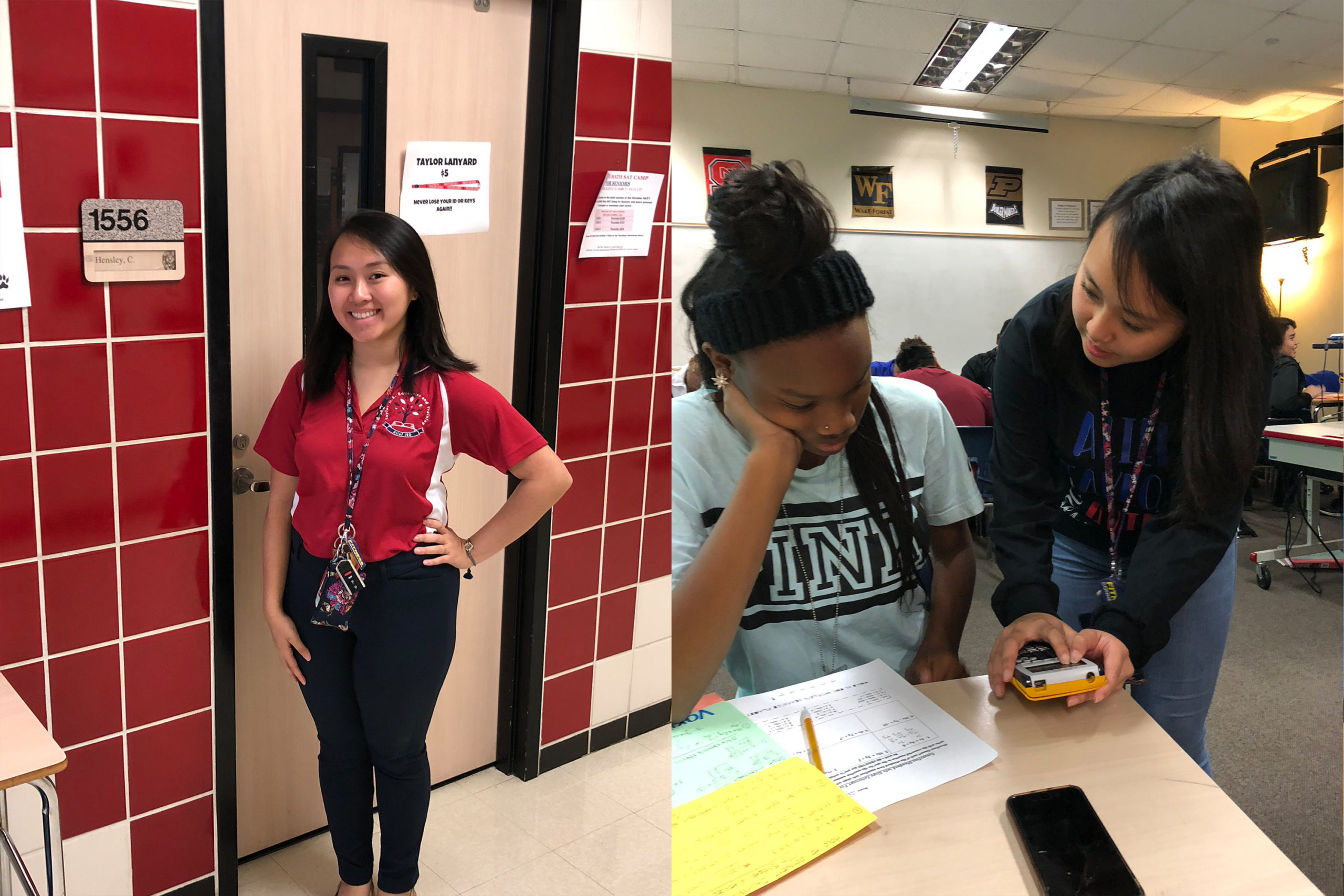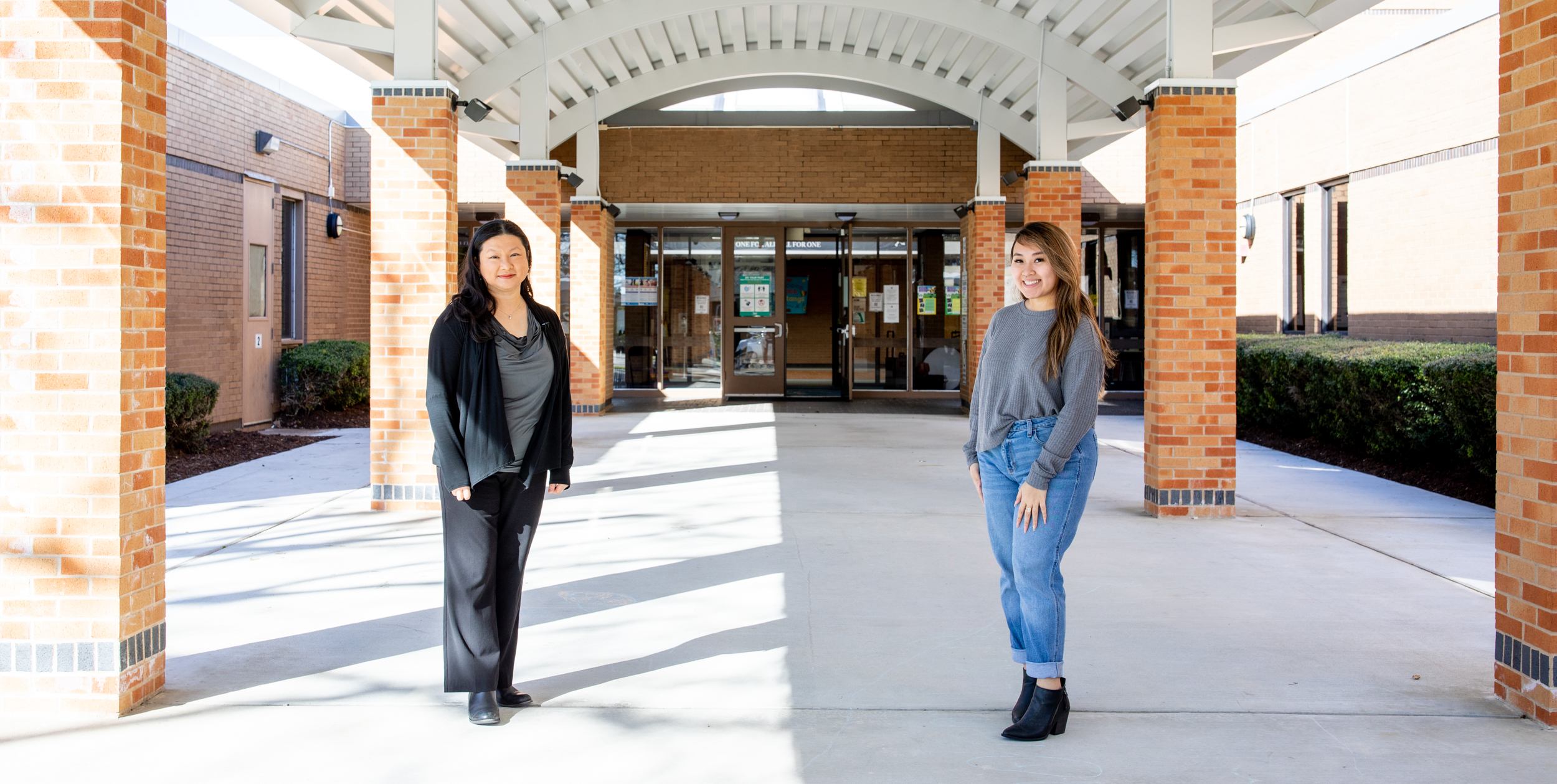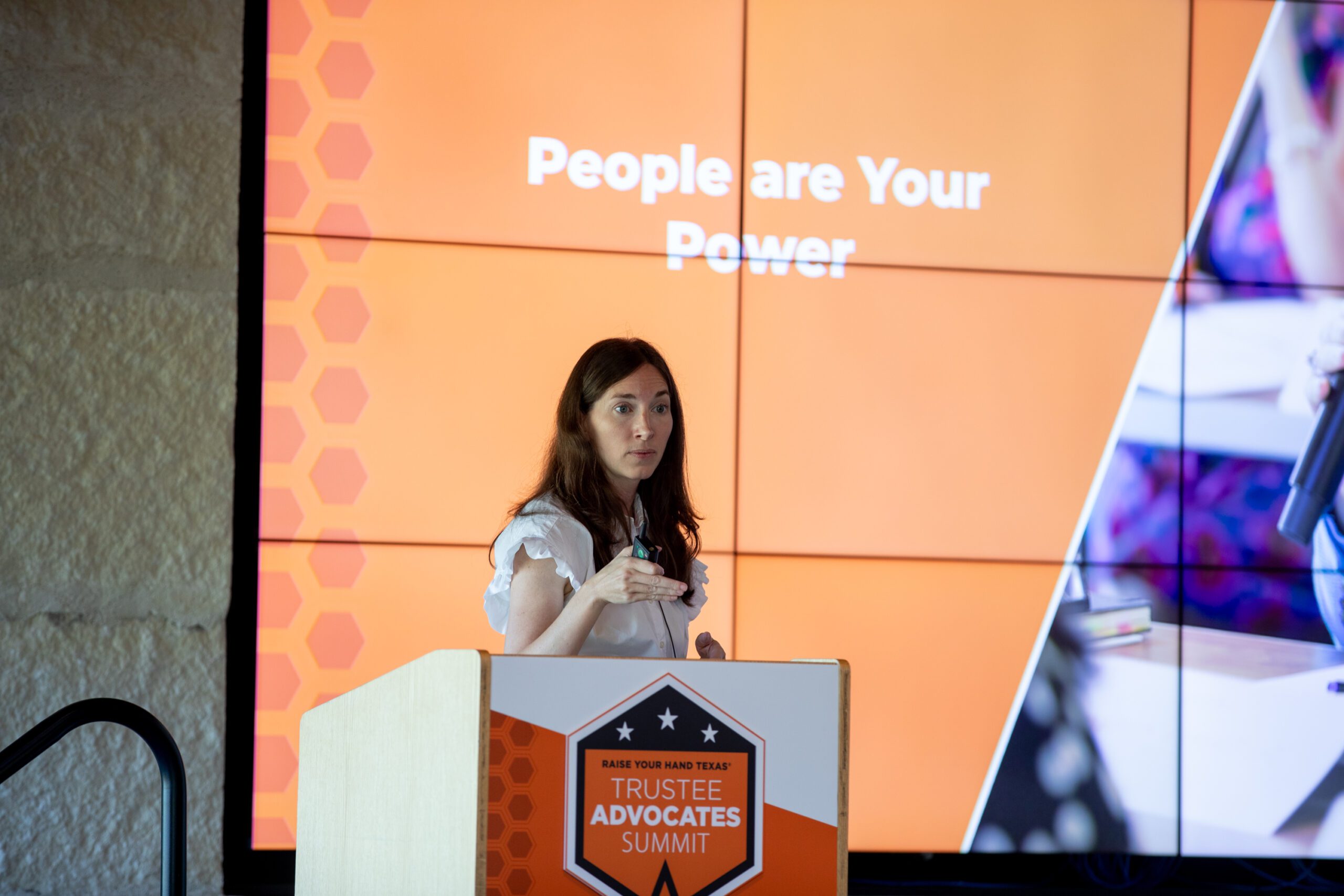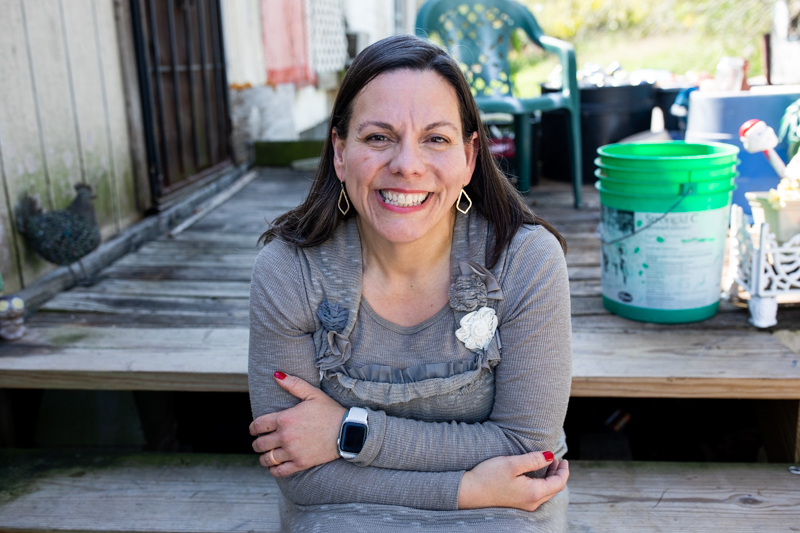
categories
Developing the Next Generation of Teachers and Leaders

May 20, 2021
Developing the Next Generation of Teachers and Leaders
*Educational leaders, like Dr. Ting-Ling Sha and Baohan Phi, represent the strength of the Asian American and Pacific Islander community, as well as their importance to, and positive impact on, the current and future success of Texas. So many of our stories, and the students, teachers, school leaders, and communities featured in them, stand as testaments to the critical role public education plays in disrupting systemic racism and ensuring a more just and equitable future for all of Texas’ students and families. Read the full letter from the President of the Raise Your Hand Texas Foundation about violence against the AAPI community and our work to advance diversity, equity, and inclusion.
An aspiring teacher in her first year of college unexpectedly finds a mentor when she reconnects with her own elementary school principal.
A.J. Martin Elementary School is tucked off of a busy stretch of Houston’s Bellaire Boulevard, just west of the city’s Chinatown. The community is decorated with distinctive Vietnamese street signs and lined with iconic mom-and-pop restaurants like Crawfish and Noodles, Pho Binh, and Lee’s Sandwiches. Buddhist temples sit across the boulevard from Catholic-Vietnamese churches and next door to Vietnamese-run health clinics, stores, and agencies. “Little Saigon,” as it is known, represents one of the largest Vietnamese enclaves in the United States.
Following the end of the Vietnam War in 1975, thousands of Vietnamese people who sided with the South Vietnamese government fled the war-torn country. Texas’ warm climate, expanding economy, and proximity to the ocean made the state attractive to many Vietnamese refugees seeking asylum and a chance at the American Dream. Many of these early Vietnamese immigrants joined the fishing and shrimping industry along the Gulf Coast. According to census data, by 2000, Harris County reached a population of 55,489 Vietnamese people – making up 28.3% of the total Asian population in the greater Houston area.
Today, “Little Saigon” is a vibrant neighborhood that takes pride in diversity and celebrating Vietnamese customs and traditions, while also honoring Chinese, Korean, Pakistani, and other neighbors.
For Baohan Phi, a sophomore at the University of Houston, this is home. Baohan fondly remembers growing up in this neighborhood and being part of the Alief Independent School District. “It was a neighborhood that really shaped who I am today.”
While Baohan fondly remembers her time at Martin Elementary, she also remembers hearing negative perceptions from those not intimately familiar with the school. People judged her school based on the fact that it is a Title I campus. When Baohan was in fourth grade, the student population was 84% economically disadvantaged and 74% limited English proficiency. While in an underserved community, Baohan found the outside judgments and biases against her school to be false. She experienced a warm, supportive community of teachers and students. “The teachers along the way gave me the inspiration to be where I am today.”
And now she is studying to become a teacher herself. Baohan is an education major at the University of Houston with dreams of teaching high school math.
Baohan’s two biggest inspirations are her mother, Soan Phi, who taught elementary and middle school Vietnamese for 10 years in Vietnam before immigrating to the United States, and Andrea Lotsu, a career and technical education teacher who became her high school mentor.
At Alief Taylor High School, Baohan had the opportunity to participate in a “grow your own” education and training program. This innovative program gives students experience with teaching over the course of four years, from learning introductory principles of education to a two-year, field-based instructional practice as an intern teacher in the district. Through this experience, Baohan developed lesson plans, managed a classroom, and built long-lasting relationships with her students.I got to see what teaching was, and I got to do hands-on activities,” Baohan says. She credits this unique high school practicum opportunity and the supportive mentorship she received from Lotsu with discovering her passion for teaching. Baohan believes the most impactful way she can give back to her community is by returning as an Alief alumni educator. By understanding her students at a deeper level, she hopes to shape the future generation, one student at a time.
 In 2018, Baohan Phi served as an intern teacher in an Algebra I classroom at Alief Taylor High School. She was a senior in high school and receiving early career training through a unique “grow your own” program.
In 2018, Baohan Phi served as an intern teacher in an Algebra I classroom at Alief Taylor High School. She was a senior in high school and receiving early career training through a unique “grow your own” program.
An unexpected reunion
During her first year at the University of Houston, Baohan applied for and received the Charles Butt Scholarship for Aspiring Teachers, a scholarship granted at universities committed to high-quality, clinical practice and awarded to promising teacher candidates interested in teaching in majority-economically disadvantaged schools or in a shortage subject area in Texas public schools.
When Baohan interviewed for the scholarship in the spring of 2018, she noticed a familiar face during the interview day – her elementary school principal, Dr. Ting-Ling Sha.
Dr. Sha says, “I was at the University of Houston doing scholarship interviews and this really cute, young, energetic girl runs up to me and says, ‘Hi, Dr. Sha. Do you remember me? I was at Martin when you were a first-year principal and I was in fourth grade!’ I saw the face, and had that dawning moment when I looked at a little girl in this adult woman standing in front me.”
Dr. Sha is a second-generation, Chinese American, who followed in the footsteps of her family in pursuing a career in education. She is a product of Alief ISD herself and has been serving in the district for 25 years. “I grew up in Alief. We are Alief proud.” She says there’s something special about growing up in the neighborhood and coming back and contributing to the community.
As a member of the Raise Your Hand Texas Foundation alumni network – a group of school leaders who have participated in one or more of Raise Your Hand’s programmatic initiatives – Dr. Sha volunteers as a panelist for selecting new cohorts of Charles Butt Scholars and as a formal mentor to current scholars. As a benefit of the Charles Butt Scholarship for Aspiring Teachers, all scholars have the opportunity to be paired with a mentor, who is an experienced educator. After their chance encounter and reunion on the interview day, Baohan and Dr. Sha stayed in touch. Then Baohan reached out to see if Dr. Sha would be her mentor. ““We want the next generation of teachers to be strong and successful and then stick with it. It was really nice to be asked to be a mentor to these fantastic women who want to continue to grow in their journey to be a teacher.”” “Dr. Ting-Ling Sha” “I love mentoring. I love coaching. I think that’s something that I thrive on,” Dr. Sha says about the connection.
Prior to COVID-19, Baohan met Dr. Sha for monthly check-ins at Martin Elementary and was thrilled to reconnect with her childhood campus. “I haven’t been back in so long. Just to be able to walk the same hallways and even meet some of the teachers that were there when I was a student, it was just extremely bittersweet.”
During their check-ins, the two work together on goal setting, problem-solving, or resume building. They talk about their families, campus life, what it’s like to navigate the pandemic as a college student and as an educator. Dr. Sha has even created opportunities for Baohan to observe classes over Zoom to see what teaching looks like during the pandemic.
“She inspired me,” Baohan says. “I also have aspirations to become a principal like her one day … These mentors, they mean everything to me, especially the fact that they’re women and that they’re teaching here in Alief. Dr. Sha was a product of Alief as well. It’s cool to see that and they’ve really guided me along the way, making sure I’m on the right track and making sure I pursue my dreams.”
Representation’s impact
Research consistently shows that having teachers of color matters and leads to positive outcomes for students of color. A report from the Learning Policy Institute titled Diversifying the Teaching Profession Through High-Retention Pathways found that “teachers of color boost the academic performance of students of color, including improved reading and math test scores, improved graduation rates, increases in aspirations to attend college.” Additionally, the report showed that teachers of color benefit from colleagues who share their identity and lived experiences: “greater diversity of teachers may mitigate feelings of isolation, frustration, and fatigue that can contribute to individual teachers of color leaving the profession when they feel they are alone.”
This means that increasing diverse representation among educators and school leaders is critical, and that the state must place a priority on recruiting, preparing, and retaining teachers of color.
“We always say that educators should represent the population of the students and community they serve,” Dr. Sha says reflecting on the importance of representation. “In a large, diverse, urban city like Houston, it’s imperative for children to see that minorities can become leaders and have a positive impact on the community. African American and Hispanic women are becoming more prevalent in educational leadership positions, but Asian Americans are slower to rise.”
We always say that educators should represent the population of the students and community they serve. In a large, diverse, urban city like Houston, it’s imperative for children to see that minorities can become leaders and have a positive impact on the community.”” “Dr. Ting-Ling Sha”
The growth in representation and retention of Asian teachers is important to the social and emotional development and learning of students in this population. According to the Texas Academic Performance Report data, when Baohan was in fourth grade, around 13% of students at Martin Elementary identified as Asian, while less than 3% of teachers were Asian. Over the last 10 years, teacher and student demographics have become more closely aligned. In the 2018-2019 school year, about 9% of students and 11% of teachers at Martin Elementary identified as Asian.
Some of this shift is likely thanks to the strength of leaders like Dr. Sha who have paved the way for other Asian teachers and school leaders to follow in their footsteps.
Dr. Sha currently mentors four Charles Butt Scholars, three of whom are Asian American women. She reflects proudly on this powerful opportunity to nurture and support a generation of aspiring teachers who share her cultural ties and lived experiences.
“I’m proud that I have three strong Asian American women who are my mentees. They actually sought me out, partly because they were interested in elementary school or in potential job opportunities in Alief, but also as I am an Asian American leader.”

Left: Phuong-Trinh TaoPham was Dr. Ting-Ling Sha’s first Charles Butt scholar mentee. The two have been paired for four years and have shared the important milestones of college graduation and the start of Trinh’s career as a third-grade dual language teacher at Gregg Elementary in the Houston Independent School District. Center: Baohan sought Dr. Sha to be her mentor after a chance encounter at an interview day that reconnected the former elementary school student and principal with one another. Right: During the interview for this story, Dr. Sha regularly checked her phone for updates from her mentee Hannah, a junior at the University of Houston who was trying on wedding dresses, such is the close nature of their relationship.
Dr. Sha loves her personal connection to her mentees as well as the impact mentorship has on the future teacher workforce. “We want the next generation of teachers to be strong and successful and then stick with it,” she says. “It was really nice to be asked to be a mentor to these fantastic women who want to continue to grow in their journey to be a teacher.”
New teachers are most likely to leave the teaching profession in the first two years. Research shows strong clinical-based preparation programs – like the early experience Baohan had in high school and her current experience at the University of Houston– lead to higher retention rates. So does having an experienced educator as a close mentor and having colleagues who have shared experiences and can support you as you navigate the challenges and rewards of being a teacher.
Dr. Sha encourages any campus or district leader to seek opportunities to mentor teachers in training and help develop the next generation of education leaders.




